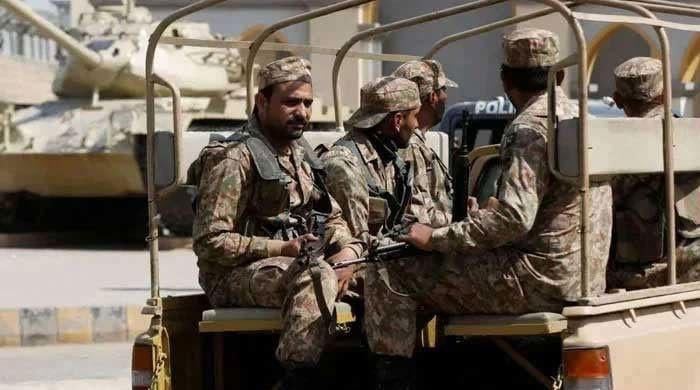- ISPR says IBO is being conducted in Quetta, Kech districts.
- Adds operation part of Azm-e-Istehkam campaign.
- President, Prime Minister pay tribute to the security forces.
At least eighteen India-backed terrorists belonging to Fitna al-Hindustan were killed in two separate operations in Balochistan, the military’s media wing said on Thursday.
The Inter-Services Public Relations (ISPR) said in a statement that an Intelligence Based Operation (IBO) was conducted in the general area of Chiltan Mountains, Quetta district, due to the reported presence of terrorists.
“During the execution of the operation, own troops effectively engaged the location of the terrorists and after an intense exchange of fire, fourteen India-sponsored terrorists were sent to hell,” it added.
In another IBO conducted in the general area of Buleda, Kech district, a terrorist hideout was destroyed and four terrorists were successfully neutralized, ISPR said.
It said arms, ammunition and explosives were also recovered from slain terrorists who remained actively involved in several terrorist activities.
The military said clearance operations are being carried out to eliminate any other Indian-sponsored terrorists found in the area.
It further said that the relentless counter-terrorism campaign under the vision of “Azm-e-Istehkam” by the security forces and law enforcement agencies of Pakistan will continue at full pace to wipe out the menace of foreign sponsored and supported terrorism from the country.
President Asif Ali Zardari and Prime Minister Shehbaz Sharif lavishly lauded the security forces for eliminating 18 terrorists from Indian proxy Fitna al-Hindustan in Balochistan, reaffirming Pakistan’s firm resolve under Azm-e-Istehkam to eradicate all foreign sponsored terrorism.
Pakistan has been grappling with rising terrorist incidents, especially in KP and Balochistan, since the Afghan Taliban regime took power in 2021.
The government has repeatedly called on the Taliban regime to rein in terror groups responsible for countless attacks in Pakistan.
However, the Taliban regime remained largely indifferent to Pakistan’s demands and gave sanctuary to several terrorist groups targeting security forces and civilians.
Instead of addressing Pakistan’s concerns about cross-border terrorism, the Taliban regime resorted to unprovoked firing along the border on 12 October.
Pakistan’s armed forces quickly retaliated, killing over 200 Taliban fighters and affiliated militants; however, as many as 23 Pakistani soldiers were martyred during the border clashes.
Security forces also carried out strikes inside Afghanistan, including in Kabul, destroying terrorist hideouts in the country.
Hostilities between forces of the two nations ceased after Pakistan accepted the Taliban regime’s request for a temporary ceasefire on 17 October.
Delegations from the two countries later met for talks brokered by Qatar in Doha, where they agreed on a ceasefire agreement.
Turkiye then hosted the second round of talks in Istanbul, which began on 25 October.
However, the talks ended without conclusions after four days over what Pakistani authorities described as the Taliban delegation’s “illogical” arguments, which they said were “detached from reality on the ground”.



